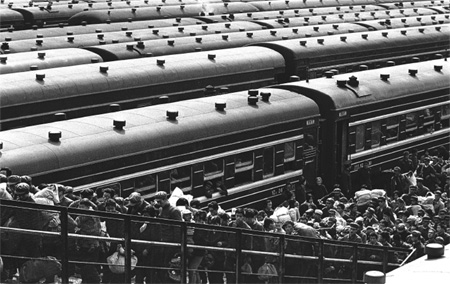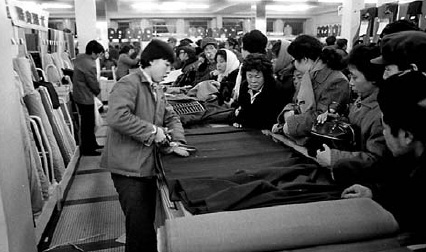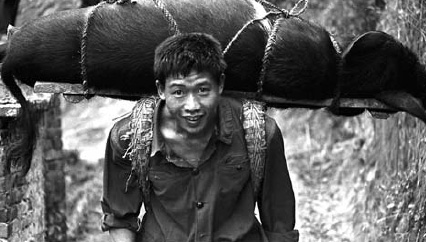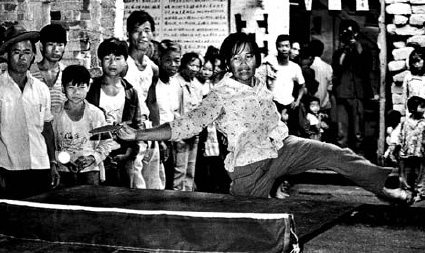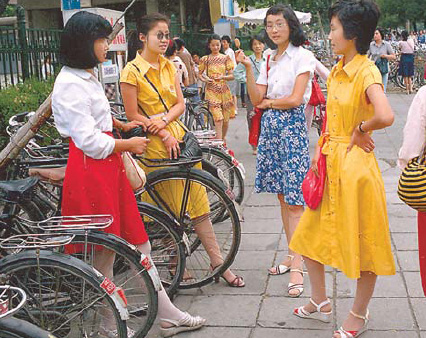Focus
30 Years - How Times, and Views, Change
Updated: 2011-05-31 07:26
By Duan Yan, Wang Yan, Hu Yinan, Cui Jia, He Na, Hu Yongqi, Xu Wei and Zhang Yuchen (China Daily)
|
A bustling Yongdingmen Railway Station in Beijing in 1981. Wang Wenlan / China Daily |
|
Ration coupons were still required to buy cloth, but a selection of fabric drew customers to Beijing Department Store on Wangfujing Street in 1983. Provided to China Daily |
'National pride has been growing' with the country since 1981, when the world saw mystery and quaintness in the People's Republic of China. Reported by Duan Yan, Wang Yan, Hu Yinan, Cui Jia, He Na, Hu Yongqi, Xu Wei and Zhang Yuchen.
Economy
At the start of China's gradual transition from central planning to a free-market economy, foreign exchange certificates were issued in exchange for foreign currency. Most purveyors of goods and services for foreigners, such as hotels and special shops, accepted only the certificates and refused Chinese money.
Ration coupons, which symbolized the central planning economy, were introduced in the 1950s and still widely used in the 1980s. People needed them to buy sugar, cloth and cooking oil.
Use of the certificates and coupons ended in the 1990s.
Reports from the West
New restrictions went into effect Wednesday to keep Chinese from using China's special money for foreigners to buy imported televisions and tape recorders in special stores.
Huge crowds poured into Peking's "Friendship Store" on Monday and Tuesday to beat the restrictions. The store is intended primarily for foreigners and accepts only the certificates issued to foreigners in exchange for foreign currency. The special store's prices are generally cheaper than in Chinese stores.
The Associated Press
July 15, 1981
Theoretically the foreign-exchange certificates are accepted anywhere, but off the beaten tourist path they may not be. Boatwomen in a central Chinese park refused them, asking for "real" money.
"Trickle of foreign money being traded in China"
Christian Science Monitor
Aug 31, 1981
Her title, Maid of Cotton, suggests a staid figure, but Karie Ross is actually an ebullient young woman. A journalism student at the University of Oklahoma, Miss Ross is a goodwill ambassador for the National Cotton Council of the United States. During the next seven months, she will be touring Canada, Spain, China and Japan trying to stir more public interest in cotton garments. Her job will be formidable in China, where cloth is rationed and individual allotments are as low as six meters a year..
"She travels for cotton"
The Globe and Mail
April 14, 1981
Current comments
Zuo Xiaolei, chief economist at China Galaxy Securities: "Foreign exchange certificates and ration coupons existed because there were supply shortages in the central planning economy. The market economy unleashed our productivity. What we are facing now, however, is an oversupply.Aninvisible hand usuallyleadsmarketsto allocate resources efficiently in a market economy. But our government still plays a big role in many sectors, and the supply and demand were unable to adjust efficiently.Future economic reform is needed."
China-US Relations
Chinese leader Deng Xiaoping and US President Ronald Reagan meet in Beijing in April 1984. China News Service
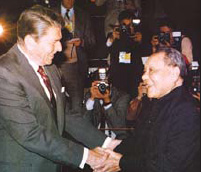
China and the United States established diplomatic relations in 1979. Ronald Reagan was sworn in as US president in 1981, the year that the expanding China-US relationship was threatened by US arms sales to Taiwan.
On Jan 4, Chinese leader Deng Xiaoping emphasized the importance of the Taiwan question, saying it was the key to developing China's relationship with the United States, Japan and other countries.
Reports from the West
President Reagan had his first long talk with a real live Chinese Communist last week. Two, to be exact: China's ambassador to Washington and the American-educated head of China's America department. No conversion resulted on either side. But the president had already been persuaded that reaffirming "normal" relations with China is a strategic priority and incompatible with his campaign pledge to put an official label on ties with Taiwan.
. . . China is not now pushing for any positive rewards from an administration it still regards with suspicion. Its minimum demand of the United States is that the relationship in which it has invested so heavily be prevented from regressing . . . Diminishing returns on China's American links could be exploited by opposing factions to devalue Mr Deng Xiaoping's entire opening to the West.
"America and China: Big must be best"
The Economist
March 28, 1981
Sen. John Glenn (D-Ohio) said here today that China's leaders believe Washington had agreed implicitly in 1978 to slash or stop weapons sales to Taiwan after Sino-American relations were normalized in 1979.
. . . U.S. officials say both sides had agreed in 1978 to shelve the complex Taiwan issue and go ahead with establishment of diplomatic relations in the hope that friendlier bilateral relations would facilitate a later solution.
"China said to believe U.S. reneged on deal"
The Washington Post
Aug 18, 1981
Despite the optimistic figures, (Commerce Secretary Malcolm) Baldrige said, some American firms have lost business because of China's recent economic readjustment policies . . . He also indicated U.S. businesses needed more information about the Chinese economy and that nation's economic organizations.
"U.S.-China trade commission proposed"
The Associated Press
June 4, 1981
Current comments
Wang Yusheng, a Beijing-based researcher and former Chinese diplomat, said China-US relations have experienced rain and sunshine over the years. "The relations differ as time changes, but there is something of each other between the two nations.
"Compared with 30 years ago, China-US relations have made it to a level where both sides treat each other equally. Only when the US took China as a partner in cooperation could it make a friend and avoid making an enemy."
|
A young man shoulders a pig to sell in a local market in Xilingxia, Hubei province, in 1982. Wang Wenlan / China Daily |
Poverty
China has achieved strong and sustained economic growth since the 1980s, but poverty persists, especially in remote rural areas. Even so, according to the World Bank, from 1981 to 2007, the proportion of China's population living in poverty fell from 65 percent to 4 percent.
Report from the West
Beggars in the southern city of Canton (Guangdong) tend to congregate at the railroad station, parks and hotels. Some are streetwise children who play on the sympathies of passers-by, especially foreigners.
All explanations point to the nationwide problem of unemployment, which the central government still has yet to solve.
Foreigners seldom see beggars in Peking. During the harsh winter in the north, many beggars hop freight trains and head south for warmth, food and possible work, a Chinese student explained.
"China's unemployment brings return of beggars"
United Press International
April 17, 1981
Current comments
Lu Linhui, a professor in Peking University's social sciences department, said China set up an anti-poverty office in 1986 and "without a doubt, the office has done a great job in helping people shake off poverty. What's worrying is that the income gap between the rich and poor is wider than ever. China should really adjust its economic structure to shorten the gap. Otherwise, more people will fall into poverty than get out of it."
|
Jiang Zhiping, a professor in Xiamen University, conducts photon tests in the laboratory after finishing his PhD in France in 1989. Xinhua |
Study Overseas
About 8,000 Chinese left for overseas studies in 1981. Meanwhile, there were nearly 2,000 foreign students in Chinese colleges, and some 500 foreign teachers of language and social science. The Test of English as a Foreign Language was given for the first time in China, and 732 people took part.
Reports from the West
These foreign teachers have been generally praised as being competent, hard working and friendly to the Chinese people.
"Expansion of overseas educational ties"
British Broadcasting Corp
June 17, 1981
Some of the Chinese students have managed to adapt to life here with astonishing ease, but most have remained isolated and alienated from American society.
"China's leap to American campuses"
The New York Times
Nov 15, 1981
Current comments
Chu Zhaohui, China National Institute for Educational Research: "In the early 1980s, both foreign students in China and Chinese students overseas were mainly sponsored by the government. Not many individuals could dream about going abroad to study on their own."
Foreigners in China
As China had just opened its door to the outside world, foreign visitors started to come to China in the early 1980s. Newspapers issued guidelines to Chinese on how to treat their foreign friends while authorities worried about "corrosive" ideas from the West. Now, about 1 million expats live on China's mainland and more than 90,000 are in Beijing.
Reports from the West
Because many Chinese have never seen a foreign visitor before, they gather around the tourist to see, to learn, and to listen. Some even try out the English that many are studying in local schools.
. . . This was my second trip to China, and everywhere I went - in the cities and in the countryside - faces were always warm and friendly and filled with great curiosity. Regardless of age, they reflect a sense of dignity and self-respect. And the faces of the children sparkle with excitement.
"The people of China"
Christian Science Monitor (Boston)
Jan 21, 1981
The official Workers Daily on Saturday cautioned Chinese who deal with foreigners to mind their manners and not leave their pants unbuttoned, eat with a knife or laugh when someone has an accident.
The column on "things to bear in mind when meeting foreign guests" was published as part of China's current campaign to promote good manners and widen relations with foreign countries.
Perhaps the most important piece of advice was, "when chatting with foreign guests, avoid political arguments at all costs."
"Tell Chinese to mind their manners with foreigners"
United Press International
March 14, 1981
The lifting of the Bamboo Curtain has caused new problems for China, including the necessity of immunizing hotel staff against seductive foreign women and imported pornography, the Peking Daily said Tuesday.
The official newspaper told of an unsuspecting attendant cleaning up a room in the Peking Hotel when a foreign woman pulled the drapes and started to "tempt and corrupt him."
It said the young man left the room right away and told his bosses about the attempted seduction.
Indoctrination had once again triumphed over the evil foreigner.
"Beware of Western women and girlie magazines"
United Press International
May 26, 1981
Current comments
Xia Xueluan, professor in sociology at Peking University: "China's national pride has been growing to treat foreigners as equal to native people when the country achieves great success in economic and social development. However, a trend still exists that western China has to follow Beijing's step to know more about foreign people and their countries."
|
A table tennis competition draws active players and intense onlookers in Wotian village, Xinxing county, Guangdong province, in 1983. Zhu Jianxing / for China Daily |
Sports
Chinese table tennis players and female gymnasts climbed to the top of the world in 1981.
Reports from the West
"In 1973, when they first came over here, they weren't very good," he (the legendary US gymnast Frank Cumiskey) said. "They had some guy who was about 35 who was their best gymnast, and he could not do a heckuva lot. And we beat their girls easily. Now they have girls 11 years old in international competition. They had about three of them compete against us."
Cumiskey flatly predicts the Chinese women - or girls, as he explains - will sweep the next Olympics and the men will do well, too. "I see the Chinese women going 1-2-3 in everything . . . They will come up with kids we never heard of who will win."
Jim Benagh's column
The New York Times
Jan 5, 1981
In men's and women's singles, Americans were outclassed by players from China, which was competing in the event for the first time. The three men and two women representing China swept through the preliminary rounds, setting up all-Chinese finals.
"Chinese give table tennis lesson to the US"
The New York Times
June 22, 1981
Current comments
Wu Wenqiang, professor at Beijing Sport University: "Sports were least hit by the 'cultural revolution' (1966-76) and kept developing. China surprised the world in the early 1980s with its excellent performance in some sports, especially gymnastics and pingpong, since its athletes had been to few international contests for more than a decade."
Young Chinese
Young people of the time, mostly born in late 1950s and early 1960s, had already experienced several significant events: The "cultural revolution" came to an end in 1976. College entrance examinations resumed a year later, promising an equal opportunity for students seeking college experiences. In late 1978, China put into effect its reform and opening-up policy.
Reports from the West
Thomas B. Gold, a sociologist from Harvard University, . . . spent a year until early 1980 at Fudan University in Shanghai. . . . Gold describes young people in Communist China's cities as alienated and cynical . . . [A] Dolly Parton fan wanted to make a contribution to his country and to do interesting work . . . "Unchallenged by his job," Gold added, "he spends most of his time either gossiping about which cadre is sleeping with which female employee, or trying to exchange cassette tapes out on the street."
"Many young Chinese reported apathetic, cynical"
The Associated Press
April 14, 1981
In China everyone works and everyone has a job, but usually not his own choosing.
Many youngsters are placed in the nursery almost from birth. Some are picked up by parents in the evening; other go home only on weekends.
Grandparents also play a large part in helping to care for the children, and they find that their pensions help the family make ends meet.
"China's working force"
Christian Science Monitor
Jan 23, 1981
Current comments
Gu Jun, a sociology professor at Shanghai University, was himself a youth in 1981. "At the time, Chinese young people were mostly ambitious and had an inextinguishable passion for knowledge. The country was experiencing a big social change, with a main theme of opening-up. How could most of them be apathetic?"
Zhou Xiaozheng, a professor of sociology at Remin University of China: "In the early days of reform and opening-up, people's lives were comparatively poorer, and the political situation was everybody's concern. Young people nowadays are all beneficiaries of opening-up, but they seem to care less about politics and social events."
|
By 1986, colorful skirts and fashionable sandals had grown common for summer wear in Beijing. Xinhua |
Fashion
More colors and new clothing styles gained popularity among the young 30 years ago, but not among many older people, who disliked flared trousers and the like. Today, one in four garments in the world is labeled "made in China".
Reports from the West
Designer Pierre Cardin presented Peking's first fashion show Saturday with Chinese models who wobbled in gold high-heels and covered bare shoulders in embarrassment.
"Yes, they were a little embarrassed," Cardin said after the show in the Peking Hotel's gilded ballroom. "But it was fantastic. They are beautiful girls, but today was the first time they wore these clothes."
The Chinese audience gaped and grinned at the space costumes, petal-skirted dresses, gold bowties, flashy men's pajamas and ornate dinner jackets.
Twenty young Chinese men and women modeled the clothes after a couple of hours' training.
The Associated Press
Nov 21, 1981
A symbol of summer is a comely girl in a sheer, short, cotton dress. She wears white gloves; a huge, floppy white sunbonnet; 2-inch plastic high-heeled shoes; and sheer nylon knee-stockings - pantyhose haven't arrived yet.
She wears imitation designer sunglasses, or gold-rimmed sunglasses that say "Made in Taiwan" - and she leaves on the label for status.
. . . Males lament that the fashion craze seems to benefit women more than men. But stylish men wear cheap, polyester Western suits and ties, rakish caps and sunglasses. Their hair is pomaded.
"Summer in Peking: New styles and romance in parks but little beer"
The Associated Press
Aug 2, 1981
Current comments
Angelia Teo, garment expert from Worth Global Style Network (WGSN): "When it comes to manufacturing and product, China is now one sophisticated place. The factories are well equipped and very efficient. But . . . styling, marketing, buzz and store experience need to come together closely for a real powerful brand. Until that happens, Chinese brands will not seem to be part of the global community of international brands."
Music
Composer-performer Jean-Michel Jarre performed in Beijing as part of a China-France exchange project.
Report from the West
About 15,000 people listened to the French composer of "Oxygene" and other best-selling albums, applauding occasionally but showing more interest in the spectacular lasers than in the eerily hypnotic music.
The stadium was about 80 percent full when the concert started, but nearly half the audience left before the end - as happens at more conventional functions, because Peking's buses stop running at about 10 o'clock.
"China is exposed to laser rock"
Reuters
Oct 22, 1981
Current comments
Wang Xiaofeng, music columnist: "China was hungry for all Western culture in 1981, either in form or in substance, and people were eager to know and obtain the essence of it, including the music. Today people take Western music more as leisure and fun for consumption."
Specials

Room at the inn
The Chinese hotel industry experiences a building boom, prompting fears of oversupply.

Pearls of wisdom
Chinese pearl farmers dominate the world market but now want to work smarter, not harder

Truly a super woman
Li Yuchun first came to prominence in 2005 as the Super Girl winner, and since then has become an international star.
